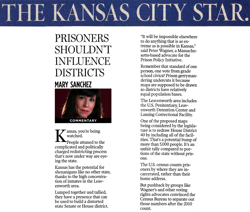Kansas shouldn’t use prisoners to influence redistricting
A new Kansas City Star piece by Mary Sanchez warns that prison-based gerrymandering may dramatically inflate the votes cast in a Kansas state legislative district.
by Leah Sakala, March 5, 2012
Mary Sanchez has just released a great piece in the Kansas City Star about how prison populations are a big deal in Kansas state legislative redistricting.
She explains that the high concentration of correctional facilities in a single legislative district may cause the most dramatic instance of artificial vote inflation in any state district in the nation:
Kansas has the potential for shenanigans like no other state, thanks to the high concentration of inmates in the Leavenworth area.
Lumped together and tallied, they have a presence that can be used to build a distorted state Senate or House district. Prisoner counts can dilute voting power in some areas while falsely ramping it up for voters living near prisons.
She points out that not only does Kansas have the ability to refuse to engage in prison-based gerrymandering, its current practice of reallocating military and school populations for redistricting purposes has served as a national model for redistricting population adjustments:
Remember that standard of one person, one vote from grade school civics? Prison gerrymandering undercuts it because maps are supposed to be drawn so districts have relatively equal population bases.
The Leavenworth area includes the U.S. Penitentiary, Leavenworth Detention Center and Lansing Correctional Facility.
One of the proposed maps being considered by the legislature is to redraw House District 40 by including all of the facilities. That’s a potential bump of more than 5,000 people. It’s an unfair tally compared to portions of the state without prisons.
The U.S. census counts prisoners by where they are incarcerated, rather than their home address. But pushback by groups like Wagner’s and other voting rights advocates convinced the Census Bureau to separate out those numbers after the 2010 count.
Meaning if Kansas wanted to play this game fairly, it could.
In fact, Kansas is considered a model for addressing the temporary residency of college students and military personnel.
The Kansas legislature needs take swift action to remove prison populations from the population data used for redistricting purposes. Otherwise the state will dilute the votes of every resident who doesn’t live next to a prison, and become a dramatic national symbol of how prison-based gerrymandering dilutes your right to vote.




